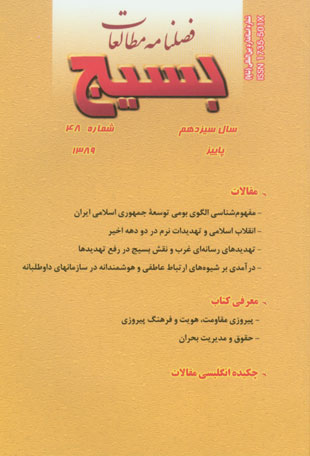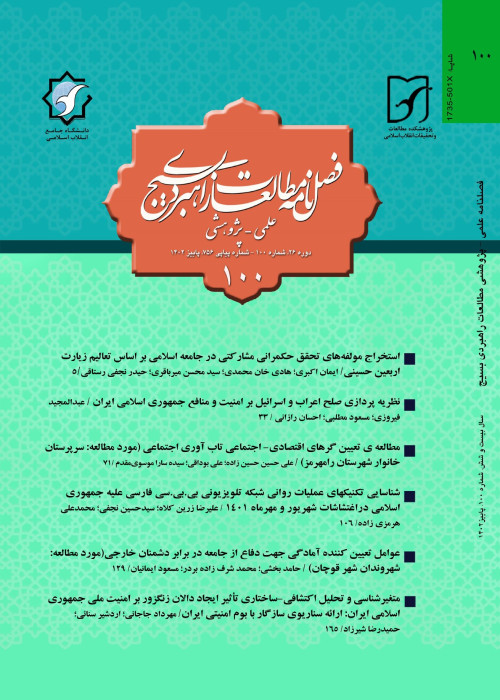فهرست مطالب

نشریه مطالعات راهبردی بسیج
پیاپی 48 (پاییز 1389)
- 168 صفحه، بهای روی جلد: 10,000ريال
- تاریخ انتشار: 1389/12/25
- تعداد عناوین: 6
- مقالات
-
صفحه 5پرداختن به الگوی بومی توسعه از ضرورتهای مهم عصر حاضر است. در این مقاله، این مهم با آسیب شناسی نظری و عملی توسعه و فهرست کردن مشکلات ناشی از به کارگیری نظریه و الگوهای رایج توسعه در جهان سوم و سپس مفهوم شناسی الگوی بومی توسعه جمهوری اسلامی ایران مبتنی بر اسناد بالادستی مانند قانون اساسی، رهنمودهای حضرت امام خمینی(ره) و بیانات ارزشمند رهبر معظم انقلاب اسلامی صورت پذیرفته و در پایان، الگوی بومی توسعه، مشتمل بر اهداف اساسی پیشرفت، عدالت و معنویت معرفی شده است. در این الگو؛ حاکمیت، مردم و روحانیت در تحقق اهداف اساسی مشارکت داشته، همزمان مسئولیتهای ویژه خود را خواهند داشت.
کلیدواژگان: آسیب شناسی، نظریه توسعه، راهبرد توسعه، الگوی توسعه، استعمار فرهنگی، الگوی بومی توسعه -
صفحه 49در این مقاله، با استمداد از دیدگاه های امام خمینی(ره) و مقام معظم رهبری، اهداف انقلاب اسلامی تبیین و سپس با مروری تحلیلی بر فرایند مسائل اقتصادی، سیاسی، فرهنگی و علمی دو دهه گذشته انقلاب اسلامی، برخی از عملکردهایی که به منزله تهدید یا لغزش، سبب انحراف از اهداف نظام بوده اند، بررسی شده است.
اولویت رشد اقتصادی و برنامه ریزی تک بعدی در دوره سازندگی و تلاشهای وسیع در زمینه های سیاسی - فرهنگی پس از دوم خرداد با الگوهای سکولار و فرهنگ لیبرالیستی، موجب انحراف برنامه ها از اهداف انقلاب اسلامی شد. مقاله حاضر بر این فرضیه بنا شده است که: برنامه های توسعه اقتصادی، سیاسی و فرهنگی، در دو دهه گذشته، یارای تامین اهداف انقلاب اسلامی را نداشته است.
بر این اساس، سوالهای تحقیق عبارتند از:1.چه نارسایی هایی در برنامه های توسعه اقتصادی، سیاسی و فرهنگی وجود داشته است؟
2.چه معیارهایی برای نقد این برنامه ها در کلام امام خمینی(ره) و مقام معظم رهبری وجود دارد؟
3.برای بازگشت به اهداف انقلاب اسلامی، چه اولویتهایی باید رعایت شود؟
لذا ضمن پاسخ به پرسشهای مذکور، اصالت و محدودیت عدالت، اولویت فرهنگ در قالب سیاستهای راهبردی و برنامه های کلان نظام و اهتمام جدی به توسعه فرهنگ و پیشرفت علم به عنوان زیرساخت اصلی برای حرکت به سوی اهداف انقلاب اسلامی تبیین شده اند.
کلیدواژگان: تعالی انسان، سازندگی، اصلاحات، پیشرفت، جنبش نرم افزاری -
صفحه 83عملکرد رسانه های غربی در شرایط کنونی با توجه به تغییر کارکردها و نقشهای کنونی رسانه از نقشهای مسالمت آمیز به رویکردهای خصمانه وجنگ طلبانه، به تهدیدی جدی برای کشورها تبدیل شده است. بسیاری از دولتهای غربی به خصوص آمریکا، از رسانه ها به عنوان ابزاری جنگی برای به کرسی نشاندن منویات و مقاصد خود بهره برداری می کنند. این امر به عنوان تهدیدی جدی برای کشورها به خصوص کشور ما مطرح است. آنچه در این مقاله بر اساس یک پژوهش ارائه شده است، بررسی عملکردهای تهدیدآمیز رسانه های غربی و نقش بسیج برای رفع آنهاست.
کلیدواژگان: تهدید رسانه، بسیج، غرب -
صفحه 121این تحقیق با هدف بررسی برخی راهکارهای ارتباط گیری عاطفی و هوشمندانه سازمان های داوطلبانه با اقشار مختلف مردم، با مطالعه موردی سازمان بسیج صورت گرفته است. روش تحقیق کیفی و به صورت بررسی و مقایسه نظرات مسئولان سازمان بسیج و نخبگان دانشگاهی بوده است. نتایج نشان داد مسئله چگونگی ارتباط سازمان بسیج با مخاطبان و اعضای مرتبط با این تشکل از اهمیت بالایی برخوردار است و بسیج به علت تعامل نزدیک و فراگیر با تمامی اقشار اجتماعی (که از انگیزه ها، توقعات و انتظارات متفاوتی برخوردارند)، لازم است برای افزایش ضریب نفوذ و تاثیر گذاری بر آنان از دو نوع ارتباط عاطفی و هوشمندانه (عقلانی) متناسب با مخاطبانش بهره بگیرد. همچنین نتایج تحقیق نشان داد که شیوه های ارتباط گیری عاطفی و هوشمندانه در قالب چند تقسیم بندی شامل درون سازمانی- برون سازمانی، صوری- محتوایی و فردی - سازمانی قابل پیگیری هستند.
کلیدواژگان: ارتباط، ارتباط عاطفی، ارتباط هوشمندانه، سازمان های داوطلبانه، بسیج، مردم - معرفی و ارزیابی کتاب
-
صفحه 137
-
صفحه 145
-
Page 5Focusing on the native model of development is a necessity of the present age. This article sets out to do so through a practical and theoretical pathology of development and listing the problems stemming from employing theory and the current models of development in the Third World and conceptualizing the native model of the Islamic Republic of Iran based on higher documents like the Constitution, Imam Khomeini's guidelines, and the Supreme Leader's noble statements. Finally, it introduces the native model of development including the fundamental objectives of progress, justice, and spirituality. According to this model, the government, people, and the clergy participate in the process of realizing the fundamental objectives, carrying out the special responsibilities of their own.Keywords: pathology, theory of development, the strategy of development, model of development, cultural colonization, the native model of development
-
Page 49This article will explain the objectives of the Islamic Republic of Iran by way of references to Imam Khomeini's viewpoints and those of the Supreme Leader who has been abiding by, and clarifying and interpreting the views held by Imam Khomeini, the Great Founder of the Islamic Revolution of Iran. Then, it tries to address a few of the behaviors (whether stemming from a threatening nature or caused by their slip) that caused deviation from the Regime's objectives by presenting an analytical overview of the process of economical, political, cultural and scientific affairs during the past two decades of the Islamic Revolution.The priority given to economic growth and unidimensional planning during the reconstruction period, and the efforts carried out in political-cultural fields after the Second of Khordad Movement marked by secular models and liberalist culture caused the programs to deviate steeply from the objectives of the Islamic Revolution. Therefore, the main hypothesis of this article is that the economic, political and cultural plans of the past two decades have not been able to meet the objectives of the Islamic Republic of Iran. The research questions are: 1-What defects have there been in economic, political, and cultural plans?2-What criteria are there in Imam Khomeini’s statements and those of the Supreme Leader on criticizing these plans?3-What priorities should be considered for the cause of returning to the objectives originally represented by the Islamic Revolution?Finally, while answering the above questions, this article addresses justice as a pivotal principle, the priority of culture through strategic policies and macro plans by the Regime, and serious efforts to develop culture and promote sciences as the essential infrastructure for progressing towards the objectives represented by the Islamic Revolution.Keywords: human elevation, construction, reforms, progress, the software movement
-
Page 83Considering the shift in the West media’s roles and functions from peaceful to hostile and warlike approaches, their performance at the present circumstances have transformed into a serious threat against countries. Many Western states especially the U.S.A are used to employing the media as a warlike instrument for carrying their purposes and intentions into effect. This is, no doubt, a serious threat on our country. This research-based article is a study to examine the Western media’s threatening functions and Basij’s role in overcoming them.Keywords: media's threat, Basij, the West
-
Page 121This research has been carried out with the aim of addressing some ways of establishing intelligent and emotional relationship with volunteer organizations with people of various sections, the case study being the Basij Organization. The research method has been qualitative in the form of comparing the views held by the authorities of the Basij Organization and university elites. The results showed that the way the Basij Organization establishes a relationship with authorities and the members related to that establishment is of great importance, and that due to the fact that Basij maintain a close and comprehensive interaction with all social sections (with different dives, and expectations), it is necessary for it to employ two types of emotional and intelligent relationship (rational) as appropriate for its audience, in order to increase the influence coefficient and the extent of influencing them. Also, the results showed that methods of establishing emotional and intelligent relationship by way of divisions including intraorganizational-extraorganizational, form-content, and individual-organizational divisions can be pursued.Keywords: relationship, emotional relationship, intelligent relationship, volunteer organizations, Basij, people
-
Page 145


